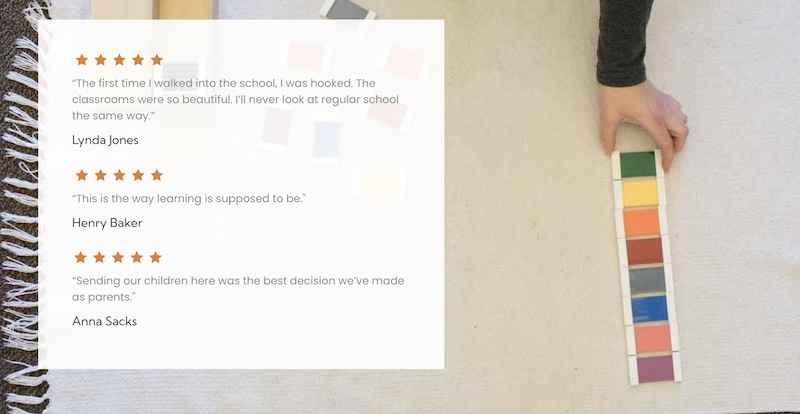The Perfect Email Marketing Formula for Montessori Schools

Never underestimate the power of effective email marketing, especially in the Montessori space. Email marketing can be a game-changer for Montessori schools looking to connect with prospective families, showcase their unique approach to education, and ultimately increase enrollment.
Crafting the perfect email sequence requires a strategic blend of informative content, compelling storytelling, and personalized messaging. When done correctly, a good email nurture will help engage prospective family and help them make a more well-informed decision about their child's schooling. In this blog, we'll break down the ideal email marketing formula for Montessori schools, step by step so that you can create a template that will help you grow your enrollment.

1. Deliver the Asset
The first email in your sequence should focus on delivering the lead magnet or asset that initially attracted the recipient to your school's website. Whether it's a guide, tuition details, ebook, video, or webinar, this email sets the stage for further engagement by providing valuable content that addresses a specific pain point or need. Keep the tone informative and welcoming, and include a clear call-to-action (CTA) that encourages recipients to download or access the asset.
Tips on the first email:
- Keep the text limited: less is more!
- Focus on the value: highlight the value of the asset you just delivered.
- Avoid "sales" language, you are delivering a free asset, simply include it and invite parents to explore.
2. Problem and Solution: Your Montessori School Is The Right Solution
In the second email, address a common challenge or concern that parents may have about their child's education. Highlight how the Montessori approach uniquely addresses this issue and offers a solution that aligns with their values and aspirations for their child. Use storytelling and real-life examples to illustrate the transformative impact of Montessori education on students' academic, social, and emotional development.
Tips on the second email:
- Be specific: Why YOUR Montessori school.
- Why Montessori is the right choice.
- Identify and highlight the unique benefits of Montessori and your school community.
3. Testimonial: Social Proof
Third-party validation is a powerful tool in marketing, and testimonials from satisfied parents, students, and alumni can build trust and credibility with prospective families. In this email, share a heartfelt testimonial or success story that showcases the positive experiences of current or former students and their families. This can come in the form of a written testimonial, or a video testimonial. Include specific details and anecdotes that highlight the benefits of Montessori education and its impact on students' lives.
Tips on the third email:
- Make sure the testimonial is personal and not all about your school. Focus on how Montessori positively impacted that child and family.
- You can use a quote or a video of a testimonial in your email.
- Wrap up the email with the ultimate success of the family and a strong call to action.

4. Overcome an Objection: Justify the Cost of Montessori Education with Lifetime Value
One common objection that parents may have when considering Montessori education is the perceived cost. Use this email to address this concern head-on by highlighting the long-term value and benefits of investing in a Montessori education. Emphasize the unique advantages, such as individualized instruction, developmentally trained guides, hands-on learning, and a lifelong love of learning, that set Montessori schools apart and justify the investment in your child's future.
Tips on the fourth email:
- Your tone should be empathetic and understanding.
- You are a thought leader, and your opinion and perspectives are valuable to parents when they are searching for the right school.
- Remember to include a call to action.
- You can use an infographic that compares Montessori to other forms of education to help you get your point across.
5. Paradigm Shift (What Sets Your School Apart)
In this email, challenge traditional notions of education and showcase what sets your Montessori school apart from conventional schools. Highlight the principles and philosophy of Montessori education, such as child-centered learning, mixed-age classrooms, and a focus on independence and self-discovery. Illustrate how these core values translate into a vibrant and nurturing learning environment where every child can thrive.
Tips on the fifth email:
- Start by establishing the problem you are solving: You are more than a daycare, you are establishing an educational foundation for the children in your classrooms.
- Pick a paradigm shift that makes you stand out from the crowd. You know what it is that makes your school special.
- Don’t put down your competition, just shine brighter than them!
6. Sales Letter (Closer Email)
The final email in your sequence serves as the sales letter or closer, where you make a compelling case for why parents should choose your Montessori school for their child's education. Summarize the key benefits and advantages of Montessori education, reinforce your school's unique selling points, and include a strong call-to-action that encourages recipients to take the next step, whether it's scheduling a tour, attending an open house, or completing an application.
Tips on the sixth email:
- Include the call to action more than once: It is the focal point of this last email
- Be clear and specific about the success that family will experience when they enroll at your school
- Don’t be afraid to sell yourself
By following this email marketing formula, Montessori schools can effectively engage with prospective families, address their concerns and objections, and ultimately inspire them to choose Montessori education for their child's journey of discovery and growth. It is also important to keep in mind a few best practices for running effective email marketing campaigns. Here's what you should remember if you want to impress parents:
-
Segment Your Audience: Segment your email list based on criteria such as current parents, prospective families, alumni, and staff members. Tailor your messaging and content to each segment's specific interests, needs, and stage in the enrollment journey. Personalized emails are more likely to resonate with recipients and drive engagement. Use a CRM to track prospective parents' journey through your admissions pipeline. Once they respond to a CTA or take the next step such as scheduling a tour or enrolling, they should be removed from that email nurture.
-
Provide Value-Driven Content: Deliver valuable and relevant content that educates, informs, and inspires your audience. Share insights, tips, and resources related to Montessori education, child development, parenting, and school events. Offer downloadable guides, webinars, and blog posts that address common questions and concerns of parents. This will help you come across as helpful rather than sales-driven.
-
Maintain Consistency and Frequency: Establish a regular email cadence that keeps your audience informed and engaged without overwhelming them. Whether it's a weekly newsletter, monthly updates, or timely announcements, consistency is key to building trust and staying top-of-mind with recipients. Be mindful of the frequency of your emails and avoid sending too many messages in a short period. Remember always to include an "unsubscribe" option for families that no longer want to hear from you.
-
Monitor and Analyze Performance: Track key metrics such as open rates, click-through rates, and conversion rates to evaluate the effectiveness of your email campaigns. Use email marketing analytics tools to gain insights into recipient behavior, preferences, and engagement patterns. Leverage this data to refine your email strategies, optimize content, and segment your audience for better targeting.
Do you want to start running effective email campaigns for your Montessori school? We have resources to help!
Explore our Email Nurture Templates on Montessori Thrive
Learn More About Our Montessori CRM That Will Help You Run Email Campaigns Automatically





0 comments
Leave a comment